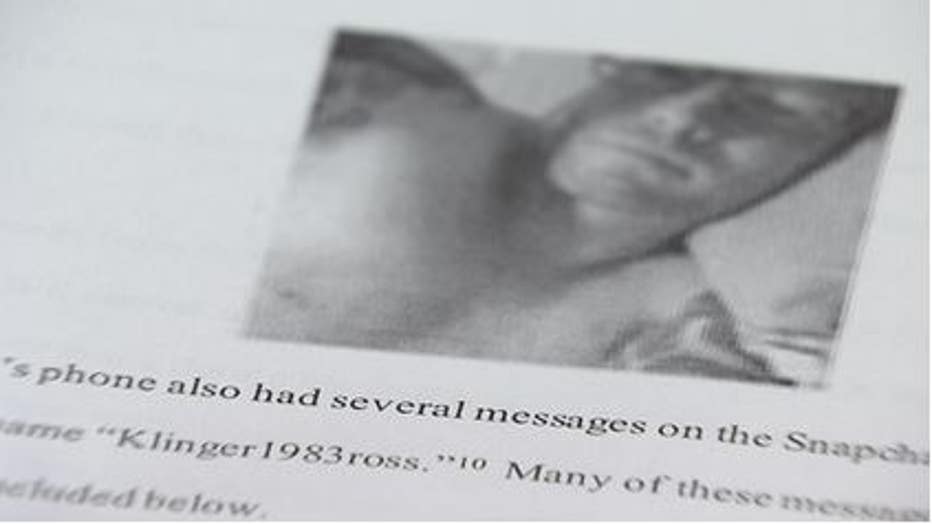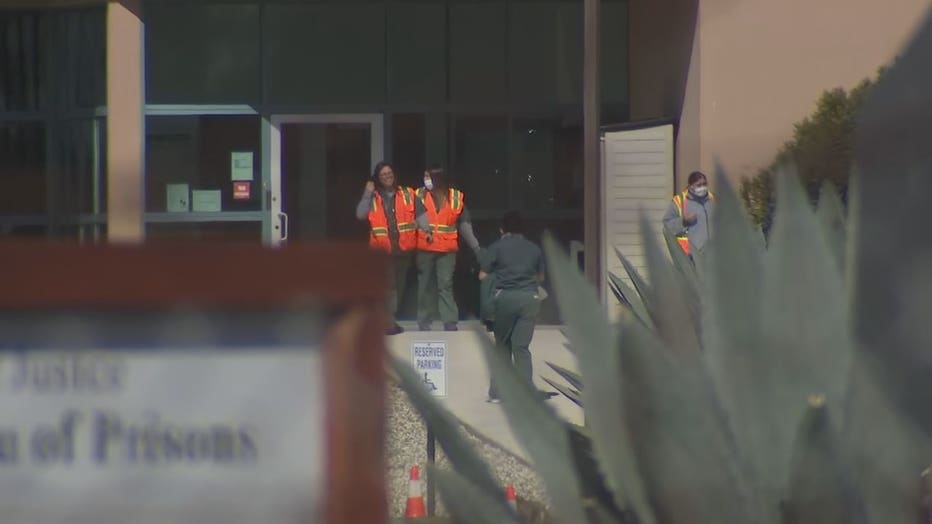Woman at center of Dublin prison sex scandal says guard used mental health files to prey on her
DUBLIN, Calif. - A woman at the center of a California prison sex scandal has come forward making an explosive new claim: Not only did a correctional officer have an inappropriate sexual relationship with her – but he also dug into her private medical records to uncover her mental frailties and then used those triggers to prey on her.
Andrea Reyes, 34, of Perris, Riverside County, explained in an exclusive interview that former correctional officer Ross Klinger obtained access to her private health files while she was incarcerated at Federal Correctional Institute Dublin – an all-women’s prison 40 miles east of San Francisco.
Klinger saw that she suffered from bipolarity, borderline personality disorder and PTSD and read about issues she’s been dealing with since high school. Then, she said, he used that information to manipulate her.
"He’s like, ‘We have access to your files,’" Reyes recounted him saying. "So he knew my whole life. He knew where I was vulnerable and what to use against me. And I don’t feel it’s OK for other women to go through it."
She knows he went through her file because "he showed it to me himself."
"Why didn’t you tell me you have PTSD?" she recounted Klinger asking her. "And I told him, I’m like, ‘What? How are you looking at that?’" He’s like, ‘We have access to your files.’"
What hurts the most is that she thought Klinger actually cared about her. He promised to marry her. To have children with her when she got out.
Now, all she feels is betrayed. And she’s sure she’s not the only one.
"I feel like he literally would pick the ones he felt were weak," she said. "I believed him. I was alone and I was vulnerable."
EXCLUSIVE: Andrea Reyes says FCI Dublin prison guard used mental health files to prey on her
Rare, first-hand account
Reyes’ account – the first public interview from a formerly incarcerated woman of its kind – comes at a time when the federal prison system as a whole is now under increasing scrutiny by the Department of Justice and Congress for widespread criminal activity among employees, critically low staffing levels and dozens of escapes.
Reyes’ claim of private record violations add a shocking new element to the already toxic allegations at FCI Dublin of sexual abuse.
Since June 2021, four correctional officers, including Klinger and the warden himself, were charged with sex crimes including having intercourse in shipping containers to taking women’s naked photos during regular rounds. The most common crime was "sexual abuse of a ward," meaning it is illegal for someone who is in a supervisory or disciplinary position to have any type of sexual contact or relationship with a person in detention.
Court documents reveal that this particular prison was nicknamed the "rape club" because of its misogynistic culture that enabled years of sexual misconduct by predatory guards, as well as cover-ups keeping the abuse out of the public eye.
On March 4, a team of House Democrats sent a letter to the Bureau of Prisons, demanding they release an audit of the facility, one of the few all-women’s prisons in the country – and where actresses Lori Loughlin and Felicity Huffman were housed after they were convicted in the college admissions scandal. On Monday, a trio of Congressional Democrats said they were putting FCI Dublin "under the microscope."

Andrea Reyes of Riverside County, Calif.
Explosive allegations of mental health violations
Forensic psychiatrist Dr. Terry Kupers of Berkeley, who has testified as an expert witness on prison conditions across the country, said he is well aware of the sexual abuse that occurs in female prisons.
But he said he has never heard of officers rifling through medical files – and he questioned how Klinger would have gotten access to these records in the first place.
"The incursion into medical records are confidential and using that information in the perpetration of sexual abuse is just beyond the pale," Kupers said. "I can’t think of anything more traumatic. It’s just a further intrusion into the woman’s body and her private space."
Adding to this harm, Kupers said, is that incarcerated women typically have histories of sexual and substance abuse. And when the people who are supposed to be keeping them safe while they serve their time act illegally and immorally, Kupers said: "It’s just an extraordinary betrayal."
In a word, Kupers called what happened to Reyes as "evil."
No one from FCI Dublin agreed to be interviewed for this story. But in an email, a spokesperson confirmed that only staff in the Health Services and Psychology Services have access to health and mental health records. Klinger should not have had this access. He worked as a recycling technician.
One employee with knowledge of the prison said it's possible that various classifications of workers would be able to access certain information from personal files such as presentencing reports, but that information is supposed to be used professionally, and not to manipulate women behind bars.
Since authorities declined an in-person interview, it was impossible to ask them if they were aware of Reyes’ allegations or if they knew that employees were allegedly reading inmates’ private files.

Former FCI Dublin correctional officer Ross Klinger pictured on a video call talking to Andrea Reyes. Source: Department of Justice
Officer pleads guilty
Klinger pleaded guilty on Feb. 10 before U.S. District Judge Yvonne Gonzalez to three felony charges of sexually abusing three incarcerated women. Originally, he was charged with having sex with only two women. Klinger faces up to 15 years in federal prison. A sentencing date has not yet been set, although his next court hearing is scheduled for May.
Klinger is not behind bars; he is living in Riverside County, not far from Reyes.
Reached by phone, Klinger’s federal public defender, John Paul Rechmuth, said he wouldn’t be making any comment on his client’s behalf.
In addition, the prison guard union at Dublin did not respond to several email requests for comment.
In a statement, Thahesha Jusino, the new warden who took over this month, said that she vowed to "work tirelessly to reaffirm the Bureau of Prisons' zero tolerance for sexual abuse and sexual harassment… I am committed to ensuring the safety of our inmates, staff, and the public. A culture of misconduct, or actions not representative of the BOP’s Core Values will not be tolerated."

Workers stand outside FCI Dublin in Alameda County.
A fuller picture of life at FCI Dublin
Reyes arrived at FCI Dublin in 2016, after pleading guilty to possessing with the intent to distribute methamphetamine, agreeing to spend 10 years in prison.
She lived there behind bars for six years and was released on house arrest in July after she got COVID and met other requirements of being convicted of a non-violent crime, she said. She is now on house arrest, monitored with an ankle bracelet for the next two years.
Reyes told KTVU that she was identified as "Victim 1" in the charging documents against Klinger and she provided confirmation from the DOJ to prove her identity.
Many of her allegations are also outlined in the federal complaint against Klinger: He put money on her commissary, had sex with her on several occasions in encounters that lasted just five minutes, gave money to her mom and visited her family, including her kids.
But then there is the fuller story Reyes said she wanted to share with the public, allegations that are not included in the formal FBI account of what transpired from April to October 2020.

Flags fly outside FCI Dublin.
No one listened to her complaints
Reyes had been to FCI Dublin before on separate but similar drug charges.
But when she showed up for a second time six years ago, she felt that things were different.
Almost immediately, another correctional officer asked to be her "sugar daddy," meaning he would get her extra treats and privileges if she would have sex with him.
"My response was absolutely not," she said. "I didn’t want to get in trouble for something stupid like that. The rumors were that you could go to the SHU (Special Housing Unit) if you got close to an officer."
She complained about the officer’s advances. To no avail.
Complaints falling on deaf ears at the prison has also been a recent focus of the DOJ, which announced in early March that authorities are investigating allegations that high-ups ignored and intimidated women and whistleblower employees.
"Nobody did anything," Reyes said. "All the staff was aware. So they feel like they can get away with anything."
And she said the female officers were just as bad as the male guards.
Then she met Klinger. He was her boss in the recycling unit. He was gruff with most people. But not with her.
He would give her special treatment, like extra commissary. He befriended her family. He was nice to her kids. He shared personal things about his past, including the fact that he also had PTSD.
"In the beginning, it was a mutual thing," she said, even though she is aware it is illegal for a correctional officer to have a relationship or sex with someone who is incarcerated.
"He started making me feel comfortable with him, started making me feel like I could talk to him," Reyes continued. "It didn't take long for him to actually say that he loved me. And he would tell me that it was because he wanted me to know that he wanted to be my provider. He wanted to be my savior, my knight in shining armor. And I believed him."
Sexual abuse exacerbated by pandemic
Klinger would knock on her door and grab her to have sex, sometimes in the storage warehouse, Reyes said.
This situation was only exacerbated by the pandemic, she said, because the women were housed alone and no one was around to see what was happening.
"We were on lockdown, so it didn’t look weird that your boss had to come get you," she said.
After a while, Reyes learned that Klinger was having sex with at least one other woman. This is corroborated by the prosecution’s introduction of "Victim 2" in the charges against Klinger.
She got mad. And told him she wanted to break it off.
Then, the threats started.

Text message former FCI Dublin correctional officer Ross Klinger (right) sent to a second incarcerated woman. Source: Department of Justice
Death threats, intimidation
"He would kick in my door and tell me you’re f—ing going to work," Reyes said. "And he would tell me that I was going up in the SHU and lose my job. He would always threaten me, I’m going to throw you in the SHU. He was in the Marines and he would tell me stories that would scare me. He would tell me, ‘If you’re not with me. I’m going to kill you. I’m going to kill you.'"
She also later learned that "Victim 2" became emotionally damaged by the nature of Klinger's behavior that she began cutting herself, nearly dying by suicide. That deeply affected Reyes.
But because of the prior sugar daddy experience, Reyes didn’t complain this time to anyone.
But in May 2020, the FBI came to her.
She doesn’t know how or why, other than agents had learned about "Victim 2" – the other woman Klinger was having sex with.
At this point, correctional officer and prison chaplain James Theodore Highhouse had already been having sex with a woman in 2018 and 2019. Highhouse pleaded guilty on Feb. 23, and faces up to 39 years in prison. His sentencing date is on July 6.
The now-retired warden, Ray J. Garcia, 54, of Merced, who had directed trainings on the Prison Rape Elimination Act, also had been sexually assaulting one woman, sexually harassing another and keeping naked pictures of one of the women on his work computer in 2019 and 2020, according to federal court documents filed in September 2021. Garcia has pleaded not guilty.
And in November 2021, federal agents had come to learn about John Russell Bellhouse, a safety administrator at the prison, who also provided a woman in prison with earrings and had sexual encounters while other women served as lookouts, court documents allege for a time period ranging from February to October 2020. Bellhouse has pleaded not guilty. His lawyer sought permission for him to move to Colorado and travel back to California for court hearings.
Other documents obtained by the Associated Press show that many incarcerated women and even whistleblower employees nicknamed this prison the "rape club."
Exclusive: Woman at center of Dublin prison sex scandal says guard used mental health files to prey on her
Andrea Reyes, 34, of Perris, Riverside County, explained in an exclusive interview that former correctional officer Ross Klinger obtained access to her private health files while she was incarcerated at Federal Correctional Institute Dublin – an all-women’s prison 40 miles east of San Francisco.
Wanting the public to know her story
Nearly two years later, Reyes said she wants the public to know more and to end the rape-culture at FCI Dublin.
That's even though she is extremely scared and vulnerable.
But she’s working on getting stronger. And she's reclaiming her life back.
Reyes sees a therapist every Saturday. She checks in at a halfway house every Wednesday. She goes to work five days a week in an Amazon warehouse and cares for her four children. Because she’s wearing a GPS bracelet to monitor her whereabouts, she is very limited as to where she can go and what she can do.
She appears confident, even though she doesn’t always feel that way inside.
But she doesn’t want what happened to her to happen to anyone else.
And she’s hoping her one voice can make a difference.
"At first, I was hesitant about really reaching out to anybody about it," she said. "And the more I thought about it, I realized that I don’t think it’s OK. I don’t think it’s fair. I don’t think it’s OK that they’re giving these people the tools to prey on."
KTVU's Christina Rendon and Associated Press reporters Michael Balsamo and Michael Sisak contributed to some background reporting in this story.
Lisa Fernandez is a reporter for KTVU. Email Lisa at lisa.fernandez@fox.com or call her at 510-874-0139. Or follow her on Twitter @ljfernandez

